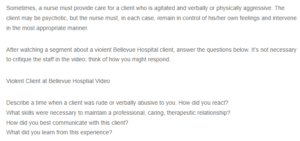Question Sometimes, a nurse must provide care for a client who is agitated and verbally or physically aggressive. The client may be psychotic, but the nurse must, in each case, remain in control of his/her own feelings and intervene in the most appropriate manner. Remaining Calm – Violent Patient After watching a segment about a violent Bellevue Hospital client, answer the questions below. It’s not necessary to critique the staff in the video; think of how you might respond. Violent Client at Bellevue Hosptial Video Describe a time when a client was rude or verbally abusive to you. How did you react? What skills were necessary to maintain a professional, caring, therapeutic relationship? How did you best communicate with this client? What did you learn from this experience?
Remaining Calm – Violent Patient
I once worked in the emergency department. One day, a patient was brought in following cannabis withdrawal. He was irritable, anxious, nervous, and restless. I remember he yelled at me, called me names, and made demeaning comments. Furthermore, he started to get physical. He pushed me and tried to hit me. I was afraid, but I explained to the patient that I was only there to help him and not harm him. I took a moment and reminded myself that I was a professional. Additionally, I have been trained to deal with such situations while maintaining professionalism.
Maintaining a professional, caring, and therapeutic relationship when dealing with patients is important. The skills that I used to create such a relationship include good communication skills, the ability to curb potentially violent situations, and the ability to remain calm under pressure. I was also well-informed about the patient’s condition, as well as predisposing factors and relieving factors. This helped to provide high-quality care. Furthermore, I was fully aware of the hospital’s laws and regulations for dealing with violent patients. Another important skill I put to the task was working well with other healthcare professionals.
For good communication with the patient, I acknowledged his feelings. I let him know that I understood he was irritable and frustrated. I ensured I spoke calmly and neutrally to avoid escalating the situation, as Hammarstrom et al. (2020) note. I also listened actively to the patient, used “I” statements, and kept my attention on trying to provide the highest quality of care to the patient. Moreover, I documented our interaction and sought help from my colleagues to further manage the patient.
I learned from the experience that a nurse is sometimes bound to deal with rude or violent patients. Nonetheless, skills that help calm such situations are effective communication, setting professional boundaries, and empathy toward the patients (Doedens et al., 2020). Effective communication can assist the nurse in calming the situation and understanding the patient’s worries, all while communicating their professional boundaries and expectations. Empathy can assist the nurse in understanding the patient’s perspective and providing care that is personalized to their specific requirements. It is also essential to learn how to handle stress during difficult situations.
References
Doedens, P., Vermeulen, J., Boyette, L. L., Latour, C., & de Haan, L. (2020). Influence of nursing staff attitudes and characteristics on the use of coercive measures in acute mental health services—A systematic review. Journal of psychiatric and mental health nursing, 27(4), 446-459. https://doi.org/10.1111/jpm.12586
Hammarström, L., Häggström, M., Devik, S. A., & Hellzen, O. (2019). Controlling emotions—nurses’ lived experiences caring for patients in forensic psychiatry. International journal of qualitative studies on health and well-being, 14(1), 1682911. https://doi.org/10.1080/17482631.2019.1682911
